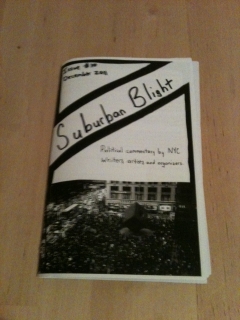3. K: I frequently meet NYC-based librarians and library students interested in participating in library-focused activism. What are some steps you would recommend for them to take to get involved?
A: I would definitely say to go to every library networking event in NYC – Meet Ups, ULU meetings, Radical Reference meetings, Desk Set mixers… you’ll see how close-knit the NYC library world is. Get on listservs too, but show your face and talk to people. Despite the cynicism of the future, librarians love their jobs and are always happy to talk to someone new.
Get off the Internet and go talk to people face to face. Lots of established people in the profession aren’t hanging around on social websites, and they’ll be your most valuable mentors. Make sure you’re talking to multiple people in different stages of their career – ask people if they’ll mentor you. REACH!
4. K: If you’re scheduled to go to a protest or other event in the middle of a downpour or snowstorm, what do you think about to inspire you to brave the weather in order to attend?
A: I’m from upstate New York so I know how to put on some layers. This year I thought about all of the workers in Wisconsin who stood outside for 20 days in the winter. We need a willingness to experience minor discomfort to stand up for each other, to take such a minimal level of personal risk, or we’re never going to be able to change.
If you keep finding excuses to not dissent or take a stand, if you’re not willing to take a risk, or are afraid of damaging your professional reputation, then you really can’t be surprised with what you get. Find your boundaries and push them and keep pushing them. I think we don’t have enough of that in the library world – to take personal and professional risks.

Suburban Blight #10
5. K: At this point in history both labor unions and libraries are targets of major financial cutbacks and are also constantly forced to justify the legitimacy of their existence. I would love to hear your opinion on possible partnerships that could be forged between labor and library workers/activists to protect their jobs and peoples’ right to utilize their industry’s services.
A: I think a lot about labor in the library world and how it affects the general trajectory. Unfortunately lots of attacks on library workers are coming from libraries themselves – from the administration, funding sources , etc. to cut labor costs. Whether it’s justified to provide service and staffing is irrelevant, as it has a concrete and chilling effect on the living standards of library workers and the ability of the profession to maintain itself as a respected and sustainable occupational choice.
We may have a million library school students glutting the labor pool, but unfortunately this is justified to create contingent and part-time workers. Even though new workers have a MLIS [Master of Library and Information Science] they may not be treated as real librarians.
Lots of library discourse says we’re being de-professionalized because libraries are using paraprofessionals to replace librarians, but that’s not the whole story. Clerical workers are fired first when cuts happen – librarians can do every job, they can work down. Libraries are moving toward relinquishing full-time staff and instead having an army of part-time and contingent workers. We’ll see more of this as Baby Boomers retire, with every institution that can – or there will be an army of library school students created as a free labor force.
Only 30% of librarians are unionized. Huge chunks are in right-to-work states and can’t form unions. Academic librarians may or may not be able to join a union because of shitty labor law. Zero national bodies exist to address concerns of library workers – ALA [American Library Association] represents libraries, not librarians.
Since there aren’t any national (or regional) bodies we have to fight our own battles, to fashion something resembling careers. This is getting harder and harder. There’s very little ability to join forces and challenge this on a professional basis. I believe that ‘s what unions do, but unfortunately existing labor law doesn’t allow us to form a national body. I think we should still do it, but I don’t know how it will be done.
Until we can build some kind of national or regional organization or form a federation to advocate for and represent library workers as employees, we are never going to solve large labor issues in library work. Every victory we get will be a local, isolated victory.
I fucking hate LSSI [Library Systems and Services, a private company which some libraries have hired to manage their services in an outsourcing framework] and privatization – it’s a threat to the very core of public libraries and we should all be fighting it tooth and nail, as well as fight the neo-liberal plan to destroy libraries.
6. If you could have dinner with 3 activists (living or dead) and after dinner listen to an album and read a zine together, who/what would you choose?
A: 3 activists: Naomi Klein, Barbara Fister, and Elaine Brown. Album: Team Dresch’s Captain, My Captain. Zine: Xtra Tuf.

